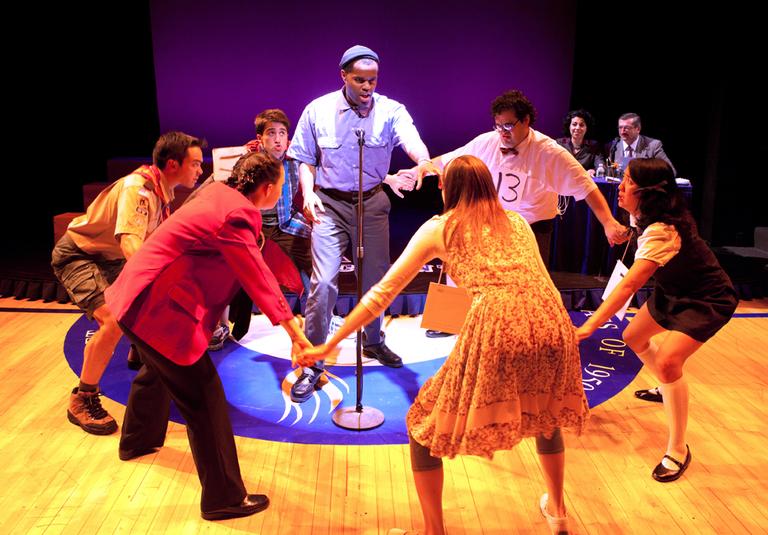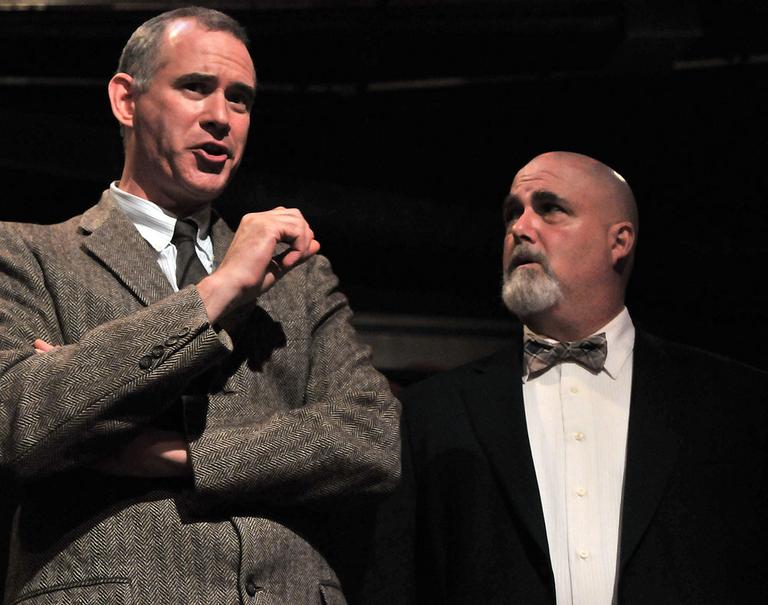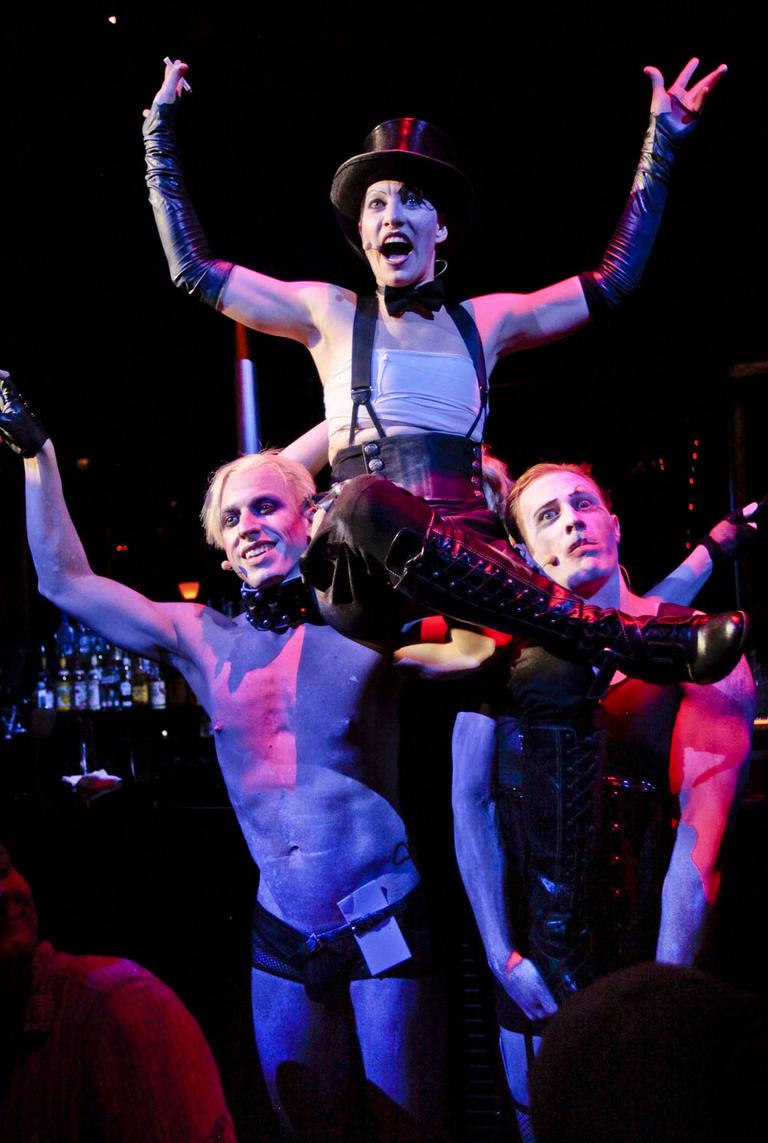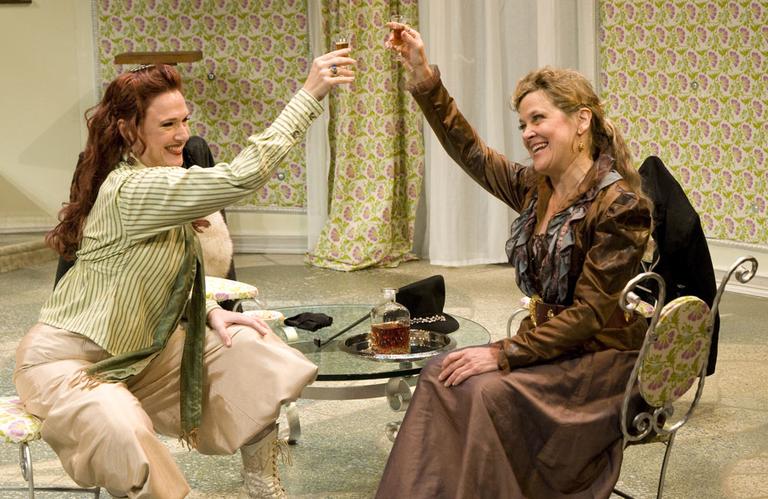Advertisement
Boston Theaters Welcome Back Fans With Crowd-Pleasers

Theater companies, for the most part, like to begin with the tried and true. It’s a way of saying to their audiences, “Welcome back, relax, this is what you like about us, we’re not going to stress you out too much right off the bat.”
That’s pretty much the formula that area theaters have followed this September, with mixed results.
'The 25th Annual Putnam County Spelling Bee'
Spiro Veloudos, the artistic director of the Lyric Stage Company, likes to begin each season with a musical, and often one that appeals to both the heart and head. You can’t do much better in that department than this utter gem, and you can’t stage a production much better than the Lyric does here.
“Spelling Bee” was pretty perfect from its opening night in a western Massachusetts high school under the auspices of the Barrington Stage Company. It imagines a spelling bee championship among a group of social misfits whose mothers and fathers are not going to win any parenting playoffs.
Maudlin, you think? Anything but. The music and lyrics were written by Bill (“Falsettos”) Finn, but what really makes “Spelling Bee” so invigorating is the book written by Rachel Sheinkin, whose sense of humor sabotages almost every potential slip into sentimentality. From the setting — the Lake Hemingway-Dos Passos Junior High — to the irreverence, the play showcases an intelligently and wonderfully warped way of looking at the world.
For example, one of the contestants, Logainne Schwartzandgrubenniere (she has two gay parents and a lisp) is given the word “strabismus” — an eye problem. She asks for it to be used in a sentence and the vice-principal (a perfectly cast Will McGarrahan) says: “In the schoolyard Billy protested that he wasn’t cockeyed. ‘I suffer from strabismus,’ he said, whereupon the bullies beat him harder.”
Advertisement
“Spelling Bee” also asks for volunteers from the audience who always seem to mesh perfectly with the cast. (Hint: You have a better chance of beating Rafael Nadal in a Grand Slam event than you do of winning this spelling bee.)
The show, after the Berkshires, went on to successful runs on Broadway as well as large theaters on the road. As good as it was in that form, it’s even better to see it return to a smaller venue, particularly when the material is handled as well as it is by director/choreographer Stephen Terrell and the excellent cast he’s assembled.
Through Oct. 2 at the Lyric Stage Company of Boston
'The Real Inspector Hound'

The Publick Theatre’s artistic director, Diego Arciniegas, has had a field day with the plays of Tom Stoppard, England’s premier living playwright. The fun continues with one of his earliest plays, “The Real Inspector Hound,” in which two affected theater critics offer a running commentary on an absurdist Agatha Christie murder mystery unfolding in front of them (and us).
This has almost the reverse spin of “Spelling Bee,” which seems like a simple musical comedy and turns out to be much smarter. “Hound” bears the Stoppardian stamp of intellectualism, but is often hilarious. If this isn’t the best cast I’ve ever seen, it certainly keeps the chuckles flowing.
Many of my colleagues have complained about the slow pace and bad timing of some of the actors. Since I saw it a little later in the run, I can only think that Arciniegas got his act(ors) together, because the timing seemed spot-on and the ensemble work as sure-handed as in “Spelling Bee.” It’s now two acts instead of one, but that makes it all the better to linger over Stoppard’s first-rate writing.
It’s a losing battle to attach any deeper meaning to “Hound,” lest you start sounding like the pretentious critics in the play. But as they and the cast of the thriller they’re reviewing become intertwined, “Hound” becomes even more of a real hoot. Laughter can be its own reward.
Through Sept. 25 at the Boston Center for the Arts, by the Publick Theatre.
'Cabaret'
Kander and Ebb at the American Repertory Theater? What’s next — Liza Minnelli in concert?
Probably not. This “Cabaret” has more to do with “The Donkey Show,” the ART’s megahit reconstruction of “A Midsummer Night’s Dream,” than it does the Broadway musical. Once again, we’re at the ART’s second stage, once Zero Arrow and now a club called Oberon. Once again, half-naked young men and women are prowling around the tables, almost luring you into the action.
Oh, and once again, the ART has a megahit on its hands. The entire run is sold out thanks to the sexy vibe of Oberon and the star of the show, Amanda Palmer, of the local rock group The Dresden Dolls. Sometimes celebrity is its own reward.

This is a considerably darker version than Ms. Minnelli and company performed, but if Bob Fosse couldn’t bring himself to make that original one darker, ART director Stephen Bogart doesn’t know when to draw back. Other productions have a tough time in balancing the fact that the decadent members of the Kit Kat Klub, including the Emcee, are both victims of the Nazis and part of the collective amorality. (The aforementioned Barrington Stage Company nailed it in a production seen locally at the Hasty Pudding Theatre.)
Here they’re practically members of the Third Reich, with their goose-stepping choreography and their smirky intrusions into the action centering on the lives of the main characters – writer Cliff Bradshaw and singer Sally Bowles, among them. At first it’s a thrilling concept, but eventually it overwhelms anything of value in “Cabaret.” It doesn’t help, certainly, that it appears that everyone has been cast for looks. The singing and acting are mediocre at best, the two exceptions being ART regulars Thomas Derrah as Fraulein Schneider and Remo Airaldi as her paramour, Herr Schultz, as they gamely hold on for whatever humanity they can find in this misshapen production.
As for the ART’s mainstage show, “Alice vs. Wonderland,” it’s a student production, the first one ever in an ART subscription season, and therefore not open to review. (So don’t look at me.)
By the American Rerpertory Theater:
“Cabaret” continues through Oct. 29 at Oberon.
“Alice vs. Wonderland” runs from Sept. 18 to Oct. 9 at the Loeb Drama Center.
“The Donkey Show” runs on Saturday nights at Oberon.
'Boston Marriage'
When Robert Brustein was running ART, he and playwright David Mamet entered into a marriage of convenience in the 1990s. Mamet had moved to the area and Brustein offered him an artistic home where he could develop his work. One of them, “Boston Marriage,” was directed by Mamet and starred his wife, Rebecca Pidgeon, and Felicity Huffman — whose husband is another member of the Mamet posse, William H. Macy.
It was never one of Mamet’s best plays — it dealt with a pair of women who had on-and-off-again eyes for each other in Victorian times, when the term "Boston marriage," referred to two women living together. But under Mamet’s direction and with actors schooled in Mamet-speak — a staccato, almost robotic style of declamation — it seemed as if the playwright was trying to show that he could wed Wilde-like theatrics to a modern sensibility and that he could write for women.

The New Repertory Theatre, which has had a particular fondness for Mamet under both its current and former artistic directors, decided to re-stage the play without the Mamet-speak. The result seems to prove all the opposites — he couldn’t write for women and that his attempt to mind-meld with Wilde was about as successful as spreading peanut butter on prime rib. David Zoffoli directs directs Debra Wise as one of the “Bostonians” and Melissa Baroni as the maid as if they’re in a sitcom, while Jennie Israel at least tries to figure out what Mamet is going on about.
It’s a losing battle in this production. The power plays and jousting between her and Wise’s character never create a spark and nobody can find whatever humor the original traded in.
Through Oct. 3 at the Arsenal Center for the Arts, by the New Repertory Theatre.
This program aired on September 21, 2010. The audio for this program is not available.
